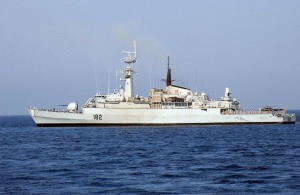China and Vietnam Agree to Maritime Cooperation
 China and Vietnam have agreed to uphold existing maritime agreements during a third round of talks in Nanning, China last week.
China and Vietnam have agreed to uphold existing maritime agreements during a third round of talks in Nanning, China last week.
Mutual agreement comes as welcoming news to observers as growing tensions between China and Vietnam have climbed in recent months over territorial rights in the South China Sea.
What are the Paracel Islands?
The South China Sea has become a political and military hot bed for territorial disputes between Vietnam and China in recent years. The Paracel Islands, known as Xisha in Chinese and Hoàng Sa in Vietnamese, have caused strains on the otherwise friendly Sino-Vietnamese relationship.
In 1974, the two countries fought the Battle of the Paracels, which ended in Chinese victory and dominance over the Paracel Islands, a group of small, but resource rich islands equidistant from China and Vietnam. Before the Battle of the Paracels, South Vietnam had control over the territory and with Vietnam’s reunification in 1975, Vietnam renewed its claims over the islands. Since then, territorial rights over the Paracels have been ongoing between China and Vietnam. However, it wasn’t until recently that China began establishing a military hold over the islands.
China’s Airstrip
In early October, Chinese state-run media stated that China had completed the construction of a 2,000 meter military airstrip on the Paracels. Vietnam’s Foreign Ministry Spokesperson, Le Hai Binh, denounced the construction project.
“Vietnam strongly protests China’s illegal actions. The action by China seriously violates Vietnam's sovereignty over the archipelagos, infringing the Vietnam–China agreement on the basic principles guiding the settlement of issues at sea signed in October 2011,” Binh said.
News of the military airstrip not only strengthens China’s sovereignty over the Paracels, but also its defense capabilities in the South China Sea. The military airstrip is an addition to Sansha City, a prefecture-level city establish by China in 2012. While it has served mainly as a tourist city for China’s citizens, China has been building a military garrison in the area since July 2012 despite ongoing dispute claims with Vietnam.
Under the goal of using a long-term approach to settle maritime disputes, the October 2011 six-point agreement established a hotline between the nation’s capitals to handle maritime disputes in a diplomatic and expedited fashion.
The Vietnam-China Working Group on Maritime Cooperation
The Vietnam-China working group on maritime cooperation was established in 2013 during high-level talks in an effort to increase China-Vietnam joint-development at sea. During the talks, Chinese Premier Li Keqiang and his Vietnamese counterpart, Nguyen Tan Dung, agreed upon creating a working relationship based upon three three tracks of cooperation–maritime, financial, and onshore.
The working group on maritime cooperation was particularly stressed as a form of creating friendlier relations between the neighboring countries. Last week’s meeting marked the third time that the working group met in order to resolve ongoing Sino-Vietnamese maritime disputes. The working group, while created under the guise of significant diplomatic progress, has done little to help the deteriorating Sino-Vietnamese relationship.
The International Community
China’s actions in the South China Sea have not only alarmed Vietnam, but multiple neighboring countries including Taiwan (People’s Republic of China), Indonesia, and the Philippines–three countries that also claim territorial rights in the South China Sea.
China considers its territory as expanding over the majority of the South China Sea based upon a nine-dashed line established in the 1940s. While this nine-dashed line has existed for decades, it wasn’t until recent years that China began hardening its claims over the area.
Despite the growing number of South Asian bilateral relationships that China has unsettled with its territorial claims, according to Alexander Vuving, a security analyst at the Asia-Pacific Center for Security Studies in Hawaii, “China is sending a message to everyone in the world about its resolve to maintain what it perceives as international integrity.”
China is taking advantage of South Asia’s economic reliance to assert its territorial dominance. Its recent unnerving actions is also extended to the East China Sea, where China has established an air defense identification zone, leading to dangerous tensions between China and Japan.
With the U.S. easing restrictions on defense sales to Vietnam and the U.S. global defense partnership with Japan, a serious confrontation in either the South or East China Sea may lead to U.S. military action. Such a scenario would surely lead to economic disaster, harming both U.S. and Chinese interests.
